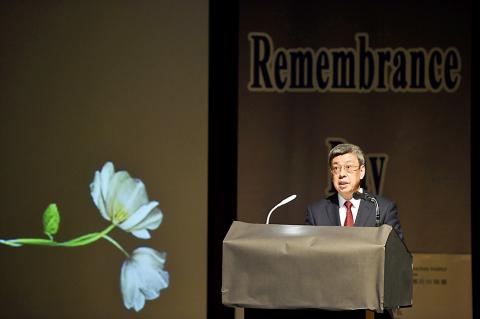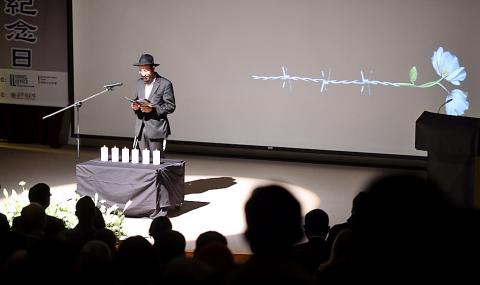Taiwan has much to learn from Germany and Israel in the pursuit of transitional justice, Vice President Chen Chien-jen (陳建仁) said yesterday at a ceremony to mark International Holocaust Remembrance Day.
The commemoration was organized by the Israel Economic and Cultural Office in Taipei and the German Institute Taipei.
Israel’s example of advocating tolerance with reference to Jewish history, and Germany’s honest self-reflection and willingness to take responsibility are worth emulating, Chen said.

Photo: George Tsorng, Taipei Times
“We deeply look forward ... to giving citizens a clearer understanding of the development of human rights in Taiwan and the hardships necessary to strive for and defend human rights, not just to remind ourselves not to repeat the same mistakes, but also to unite and work together,” Chen said.
Taiwan would do its best to continue to stand with the international community in defense of common values of democracy, freedom and human rights, he said.
A 2005 UN resolution designated Jan. 27, the day on which Auschwitz-Birkenau, the largest Nazi concentration and extermination camp, was liberated in 1945, as the international day to commemorate the genocide in German-occupied Europe of more than 6 million Jews, as well as Roma, disabled people, homosexuals and other groups.

Photo: George Tsorng, Taipei Times
Israel Representative Asher Yarden and German Institute Taipei Director-General Thomas Prinz thanked Taiwan for holding a ceremony for the fourth consecutive year.
Some have questioned the need to commemorate the Holocaust, whether “in innocence” or “with malice,” Yarden said, adding that it is important to honor survivors and recognize the uniqueness of the Holocaust, which “has become an ethical code, a scale according to which every genocide in the modern era is measured.”
Taiwan’s participation made it part of a group that “unequivocally declares its commitment to human rights, to democratic values, to the commemoration of the Holocaust and to the learning of its lessons,” the Israeli envoy said.
Prinz said it was important to “promote a culture of remembrance as a bridge between the past and present,” especially as the number of Holocaust survivors dwindles with each year.
Taiwan’s participation in the ceremony put it among the ranks of other liberal democracies, which are “strong bulwarks against human rights abuses and genocide,” he said.
Earlier in the ceremony, Rabbi Shlomi Tabib of the Taipei Jewish Center delivered a prayer in Hebrew.
A video of Taiyuan Puppet Theatre Co’s (台原偶戲團) 2012 play I Have a Name (我有名字), which depicts the real-life stories of three children in the Netherlands aged one-and-a-half to 15 who were killed during World War II, was also shown during the ceremony.

Right-wing political scientist Laura Fernandez on Sunday won Costa Rica’s presidential election by a landslide, after promising to crack down on rising violence linked to the cocaine trade. Fernandez’s nearest rival, economist Alvaro Ramos, conceded defeat as results showed the ruling party far exceeding the threshold of 40 percent needed to avoid a runoff. With 94 percent of polling stations counted, the political heir of outgoing Costa Rican President Rodrigo Chaves had captured 48.3 percent of the vote compared with Ramos’ 33.4 percent, the Supreme Electoral Tribunal said. As soon as the first results were announced, members of Fernandez’s Sovereign People’s Party

EMERGING FIELDS: The Chinese president said that the two countries would explore cooperation in green technology, the digital economy and artificial intelligence Chinese President Xi Jinping (習近平) yesterday called for an “equal and orderly multipolar world” in the face of “unilateral bullying,” in an apparent jab at the US. Xi was speaking during talks in Beijing with Uruguayan President Yamandu Orsi, the first South American leader to visit China since US special forces captured then-Venezuelan president Nicolas Maduro last month — an operation that Beijing condemned as a violation of sovereignty. Orsi follows a slew of leaders to have visited China seeking to boost ties with the world’s second-largest economy to hedge against US President Donald Trump’s increasingly unpredictable administration. “The international situation is fraught

MORE RESPONSIBILITY: Draftees would be expected to fight alongside professional soldiers, likely requiring the transformation of some training brigades into combat units The armed forces are to start incorporating new conscripts into combined arms brigades this year to enhance combat readiness, the Executive Yuan’s latest policy report said. The new policy would affect Taiwanese men entering the military for their compulsory service, which was extended to one year under reforms by then-president Tsai Ing-wen (蔡英文) in 2022. The conscripts would be trained to operate machine guns, uncrewed aerial vehicles, anti-tank guided missile launchers and Stinger air defense systems, the report said, adding that the basic training would be lengthened to eight weeks. After basic training, conscripts would be sorted into infantry battalions that would take

GROWING AMBITIONS: The scale and tempo of the operations show that the Strait has become the core theater for China to expand its security interests, the report said Chinese military aircraft incursions around Taiwan have surged nearly 15-fold over the past five years, according to a report released yesterday by the Democratic Progressive Party’s (DPP) Department of China Affairs. Sorties in the Taiwan Strait were previously irregular, totaling 380 in 2020, but have since evolved into routine operations, the report showed. “This demonstrates that the Taiwan Strait has become both the starting point and testing ground for Beijing’s expansionist ambitions,” it said. Driven by military expansionism, China is systematically pursuing actions aimed at altering the regional “status quo,” the department said, adding that Taiwan represents the most critical link in China’s